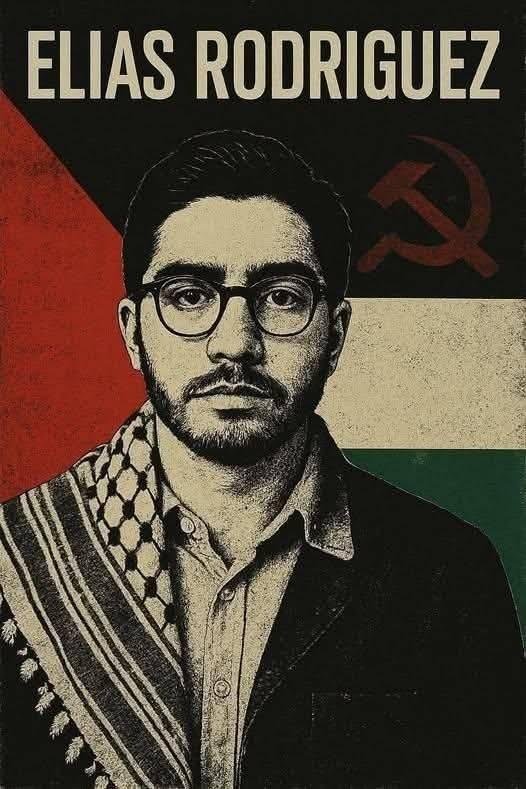Glorifying a Killer: How the Pro-Elias Rodriguez Movement Strips Away the Last Pretense of Moral Boundaries
Executive Summary
The murder of two Israeli embassy staffers in Washington, D.C., by Elias Rodriguez has become a flashpoint in the global campaign to normalize politically motivated violence. As Iranian state media, radical Western activists, and militant-aligned organizations openly celebrate the attack, a disturbing ideological front emerges—one that not only justifies terrorism but seeks to institutionalize it as a model for future “resistance” against perceived Zionist and imperialist targets.
Analysis
The killing of Yaron Lischinsky and Sarah Milgrim—two Israeli embassy staffers shot in cold blood outside the Capital Jewish Museum—was not just an act of domestic terrorism. It is now being rebranded by a growing network of extremist sympathizers as a revolutionary catalyst. At the center is Elias Rodriguez, a self-styled resistance fighter whose defenders have adopted the language of anti-colonial struggle to absolve and glorify his murders. This campaign, led by groups like the Free Elias Rodriguez Organizing Committee and endorsed by international radical collectives, is laying the ideological groundwork for a new, dangerous frontier in extremist activism.
This shift was crystallized in the Committee’s open manifesto, which frames Rodriguez’s attack as “justice” and “morally righteous,” positioning him as an “avatar of our movement.” Their argument leans on twisted interpretations of international law, asserting that since nation-states have failed to stop the war in Gaza, it falls to individuals to impose consequences—including lethal ones. Such rhetoric intentionally obliterates the line between protest and murder, substituting grievance for justification and turning embassies and diplomats—protected under international conventions—into legitimate targets.
The campaign has gained momentum through social media amplification and support from ideological organs like the Bronx Anti-War Coalition and Resistance News Network. Rallies celebrating Rodriguez as a martyr have featured flags of designated terrorist organizations, including Hezbollah and Hamas, and speeches endorsing “armed struggle” as the only path to liberation. One speaker explicitly declared that anti-Zionism cannot stop at criticizing Israel’s policy—it must become physical resistance, no matter the cost.
Perhaps most chilling is the international applause. Iranian state broadcaster Channel 2 hailed Rodriguez as “an American Yahya Sinwar” who “sent two Zionist dogs to hell,” endorsing him as part of a new Western front in the Axis of Resistance. This state-backed glorification of a domestic terror act not only reflects Iran’s propaganda goals but signifies how foreign actors now directly engage with and encourage radicalization inside the U.S.
Charlotte Kates of Samidoun echoed this sentiment, claiming embassies are “distributed directors of genocide” and arguing that diplomats are indistinguishable from combatants. This echoes the long-debunked strategy of dehumanizing targets to justify acts of terror. Meanwhile, support from radical organizations like the United Liberation Front for Palestine, Resistance Archives, and the Diaspora Pa’lante Collective lends a veneer of organized legitimacy to what is essentially the celebration of murder.
Behind these ideological defenses, the real-world consequences are devastating. Lischinsky and Milgrim were not battlefield figures; they were engaged in diplomacy and cultural outreach. Their deaths were not strikes against a military regime but the extinguishing of two lives dedicated to dialogue. Intelligence assessments now warn that Rodriguez’s attack may serve as inspiration for copycat incidents, especially with the growing normalization of violence by anti-Israel coalitions. The case represents a dark convergence of online radicalization, antisemitic incitement, and legitimized extrajudicial killings—all under the banner of resistance.
The movement to canonize Rodriguez is not merely an expression of solidarity with Palestine—it is a radical pivot away from nonviolent advocacy to a model of ideological militancy with no ethical floor. It lays bare the dangerous reality that segments of the pro-Palestinian left are now aligning with state-sponsored terror narratives, eroding any distinction between activism and armed insurgency. In doing so, they betray not only the memory of the victims, but the cause of peace itself.


